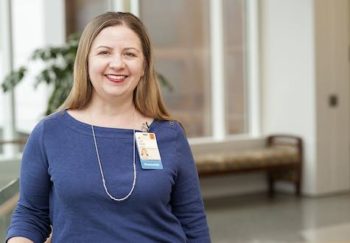
You may have been lucky enough to score your mom’s high cheekbones and your dad’s doe eyes. But if one of your parents or another first-degree relative has been diagnosed with colon cancer, you may have inherited that trait, too.
“Having a family history of colon cancer can increase your risk of a diagnosis by as much as four times compared to the average person,” says Ann Rigdon, RN, nurse administrative coordinator for the UVA Colorectal Cancer Screening Program. “It’s a greater risk factor than anything else. People tend to focus on modifiable risk factors like smoking, sedentary lifestyle, drinking alcohol – but these things have less of a link to colon cancer than family history.”
So are many cases of colon cancer hereditary? That would be a resounding “yes.”
Colon Cancer Prevention Is Possible
Here’s the good news: colon cancer is the only cancer that is almost always preventable.
“We can estimate that at least 50% of deaths — maybe more — from colorectal cancer are preventable with screening,” says Rigdon. “With most other cancers we have tests to find them early. There’s mammogram for breast cancer and a PSA test for prostate cancer. But those are focused on finding cancer in the early stage, not finding it before it happens. With colorectal cancer, we have an opportunity to try to stop it in its tracks before it happens.”
Talking Polyps: An Act of Love
When you get screened for colon cancer, doctors look for polyps. This abnormal tissue grows on the lining of the colon. Often these growths are non-cancerous. But they can become malignant over time. That’s why we want to find and remove them sooner rather than later.
Talk to your immediate family members about their medical history. Find out if they’ve had polyps. Asking your sister about her colonoscopy results may not be polite dinner conversation. But you could try a quick-and-easy text message (emojis optional).
Even if you feel uncomfortable, this kind of conversation could save your life.
“This is why we have Colorectal Cancer Awareness Month,” says Rigdon. “We have to get over the embarrassment, because we are losing loved ones. The more we can normalize that conversation, get people to understand that screening results have ramifications for all family members, then maybe people will see that it’s an act of love to share your colonoscopy results.”
When Should You Start Screening for Colon Cancer?
If You Are Average Risk
Average-risk patients are healthy. They have no family or personal history of polyps or cancer and no signs or symptoms of gastrointestinal problems. If you fall into this category, the American Cancer Society recommends that you begin screening at age 45.
Until very recently, the recommendation was to begin screening at age 50. However, the number of younger patients diagnosed with colon cancer has been steadily increasing. The exact reason for the increase is uncertain, but researchers from the American Cancer Society point to the link between colon cancer and obesity, unhealthy diet and sedentary lifestyle.
As a result, many doctors have started addressing the topic sooner. Insurance companies, too, have now begun approving the test for patients younger than 50. (Talk to your insurance provider prior to screening to ensure you’re covered.)
If You Are High Risk
If you have a family history of polyps or colon cancer, the recommendations vary.
“The age you should begin screening depends on how many family members you have with a history of colon cancer and what ages they were diagnosed,” says Rigdon. “In general, the recommendations are to start screening 10 years before your first-degree family member was diagnosed.”
So, if your brother was diagnosed at age 50, you want to start screening at age 40. If you’ve had more than one family member diagnosed, you may want to begin even earlier.
Work with your primary care doctor to determine the best screening schedule for you. Sharing your family history is the most important first step.
The Best Test for High-Risk Patients
More colon cancer screening options exist than ever before. Some don’t require the prep. You can even do some in the privacy of your own home. Any screening is better than no screening, of course. But if you have a family history of colorectal cancer or polyps, the gold standard is still a colonoscopy.
Still Dreading the Prep?
Learn more about what happens during colonoscopy screening.
“The other options for screening are perfectly legitimate for the average-risk person,” says Rigdon. “But if you have a family history, you should be strongly guided toward a colonoscopy. It’s a much higher-quality test. You have someone visually examining the entire lining of the colon, from start to finish. So if anything is there, it is less likely to be missed compared to other tests. It is so thorough that the results are good for 10 years if nothing is found.”
As for the downsides of the colonoscopy, Rigdon says, based on her own experience, it’s not as bad as people make it out to be. “The colonoscopy does require the prep, sedation and some planning, because it is an invasive procedure,” she says. “But it’s just one day.
It’s well worth the hassle if it can save your life.”

